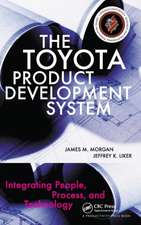Data Envelopment Analysis: Theory and Techniques for Economics and Operations Research
Autor Subhash C. Rayen Limba Engleză Paperback – 18 iul 2012
| Toate formatele și edițiile | Preț | Express |
|---|---|---|
| Paperback (1) | 427.37 lei 6-8 săpt. | |
| Cambridge University Press – 18 iul 2012 | 427.37 lei 6-8 săpt. | |
| Hardback (1) | 547.79 lei 6-8 săpt. | |
| Cambridge University Press – 6 iun 2004 | 547.79 lei 6-8 săpt. |
Preț: 427.37 lei
Nou
Puncte Express: 641
Preț estimativ în valută:
81.78€ • 85.61$ • 67.67£
81.78€ • 85.61$ • 67.67£
Carte tipărită la comandă
Livrare economică 05-19 aprilie
Preluare comenzi: 021 569.72.76
Specificații
ISBN-13: 9781107405264
ISBN-10: 1107405262
Pagini: 366
Dimensiuni: 152 x 229 x 19 mm
Greutate: 0.49 kg
Editura: Cambridge University Press
Colecția Cambridge University Press
Locul publicării:New York, United States
ISBN-10: 1107405262
Pagini: 366
Dimensiuni: 152 x 229 x 19 mm
Greutate: 0.49 kg
Editura: Cambridge University Press
Colecția Cambridge University Press
Locul publicării:New York, United States
Cuprins
1. Introduction and overview; 2. Productivity, efficiency, and data envelopment analysis; 3. Variable returns to scale: separating technical and scale efficiencies; 4. Extensions to the basic DEA models; 5. Non-radial models and Pareto-Koopmans measures of technical efficiency; 6. Efficiency measurement without convexity assumption: free disposal hull analysis; 7. Dealing with slacks: assurance region/cone ratio analysis, weak disposability, and congestion; 8. Efficiency of merger and break up of firms; 9. Efficiency analysis with market prices; 10. Nonparametric approaches to production analysis; 11. Measuring total factor productivity change over time; 12. Stochastic approaches to data envelopment analysis; 13. Looking ahead.
Recenzii
"...none of the books on DEA that are available in the market today examines DEA from an economist's point of view. Subhash Ray's Data Envelopment Analysis is an exception. This book familiarizes the reader with the microeconomic foundations of the various DEA models that are currently available and widely used in the literature. Professor Ray explains the neo-classical production theory behind various DEA models. It is up-to-date and gives an excellent overview of DEA models from both empirical and theoretical points of view. Professor Ray is a leading authority on DEA. Every chapter of the book shows his mastery in the field. I am confident that the researchers at all levels working on DEA will immensely benefit from reading this book." Subal C. Kumbhakar, State University of New York, Binghamton
"Firmly grounded in the economic theory of production, and richly illustrated with a battery of numerical and computer-driven examples, Data Envelopment Analysis achieves both objectives. Professor Ray is a leading researcher in the field, and he has written a valuable book from which scholars and their students will learn a great deal." C.A. Knox Lovell, University of Georgia
"This lucid treatment of data envelopment analysis is the most thorough and extensive available, and unifies economics, operations research, and management science on this topic. The exposition contains plenty for both those wanting a theoretical treatment and for practitioners primarily interested in applications. The comprehensive book fills a critical gap in the literature, and will be highly valued by applied researchers in government, universities, and the private sector interested in measuring economic efficiency and productivity." Dale Squires, National Oceanic and Atmospheric Administration
"Only a deep understanding of the economics of production can provide an Ariadne's thread to find oneas way through the existing literature on efficiency analysis in general and on the DEA method in particular. In this book, Professor Ray offers the reader an enlightening guidance through this maze, thanks to his equal mastery of the economic conceptual foundations of the field and of the mathematical programming techniques that have rendered it widely applicable. The result is a choice of topics that bear on basic aspects of the efficiency issue more than on technical virtuosity. Among these, the way FDH is put in its proper nonparametric production theoretic perspective pleases me most." Henry Tulkens, CORE, Université Catholique de Louvain
"Firmly grounded in the economic theory of production, and richly illustrated with a battery of numerical and computer-driven examples, Data Envelopment Analysis achieves both objectives. Professor Ray is a leading researcher in the field, and he has written a valuable book from which scholars and their students will learn a great deal." C.A. Knox Lovell, University of Georgia
"This lucid treatment of data envelopment analysis is the most thorough and extensive available, and unifies economics, operations research, and management science on this topic. The exposition contains plenty for both those wanting a theoretical treatment and for practitioners primarily interested in applications. The comprehensive book fills a critical gap in the literature, and will be highly valued by applied researchers in government, universities, and the private sector interested in measuring economic efficiency and productivity." Dale Squires, National Oceanic and Atmospheric Administration
"Only a deep understanding of the economics of production can provide an Ariadne's thread to find oneas way through the existing literature on efficiency analysis in general and on the DEA method in particular. In this book, Professor Ray offers the reader an enlightening guidance through this maze, thanks to his equal mastery of the economic conceptual foundations of the field and of the mathematical programming techniques that have rendered it widely applicable. The result is a choice of topics that bear on basic aspects of the efficiency issue more than on technical virtuosity. Among these, the way FDH is put in its proper nonparametric production theoretic perspective pleases me most." Henry Tulkens, CORE, Université Catholique de Louvain
Descriere
This book, first published in 2004, explores data envelopment analysis, which measures firms' input-output efficiencies using mathematical programming techniques.

















